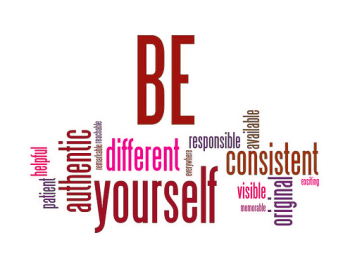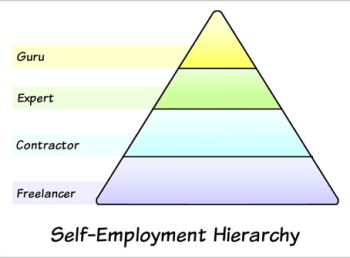In addition to being a community manager, I do a lot of freelance work — or, should I say, guru work. (You’ll see what I mean below.) And before I found a nice home at a proper company, I was doing freelancing full-time. I get loads of questions about how I got started in the freelance world, and while every freelancer I’ve met has had a different journey, I wanted to share some of the tips that helped me become a successful self-employed social media, writing and communications consultant.
1. Never turn down a job
When I first started freelancing, no job was too small. I took very involved but extremely low-paying jobs to build up my resume. It might seem annoying that you’re working for pennies (or pence, or whatever) at first, but your knowledge (and your resume) grow with each job you take.
2. Keep in touch
My most loyal clients now were also my first clients. Although my expertise, skill set and knowledge has grown by leaps and bounds, these people have stayed loyal to me because I’ve kept in touch. One annoying thing about consulting is that you don’t see things through — you offer your services, you’re paid and you move on. Or you’re supposed to, anyway. I always follow-up and offer insights, tips or even an hour or two for free. Why? Because a) I want to see how things turn out and b) keeping in touch is how you grow relationships.

3. Brand yourself
This doesn’t mean that you keep on telling people you do social media consulting or web design over and over. Although it saddens me to say this as a writer, words are just words. You need to put your money where your mouth is. For years I was reticent to set up a website, or get active on social media (or start a blog, for that matter). But I realized that the more I put myself out there, the more likely I was to be found, especially if I put the puzzle pieces together for people looking for services in my field. So I decided to show people who my claim to being a social media consultant, copywriter and marketing specialist wasn’t just talk; I started marketing myself through the very channels through which I offer services to other people — namely, digital and social media channels — to showcase my skill set. And have a little fun, of course.
4. Don’t quit your day job
There were so many times starting out when I thought I could quit my day job because I was making bank. Or I was up until 2am working on a project for a client. Lo and behold, the project would finish up and I’d have a super dry spell — and I would then be very happy I had a full-time gig. I didn’t quit until I had solid contracts, several clients who had me on retainer and, most importantly, some savings should a dry spell occur.
5. There’s help out there — take it
Don’t feel like your website should be the only thing driving clients to your business. There are websites out there that can help you connect with potential clients — use them! I’ve had insane luck on Elance; Guru, ODesk and 3desk are also good sources for work. On these sites, you can find some people who want to pay you ridiculously low wages for pretty intense work, but after you build up your reputation and resume, you can start being choosy about what you take on.

6. Become a guru — and use data to back up your claim to fame
If you’re like me, you’re probably thinking that the only person who should be called a guru is a spiritual leader in South Asia. Ok, fair point, but if we’re following the self-employed hierarchy, you want to be called a guru, no matter how much of a misnomer the name turns out to be. This is the hardest part of the puzzle for most people. That’s because you’re all too modest! But if you’ve got data to back yourself up, why not go to town describing all the awesome things you’ve achieved and why you deserve guru status? As soon as I started showing positive results for clients, I let other people know it in my proposals and on my website. I wasn’t modest but I wasn’t overly hyperbolic, either; I let the numbers speak for me.
7. Go big or go home
Don’t be shy. See a shoddy website you could redesign? See a tragic marketing campaign that you can set straight? Contact a power that be at the company or organization you’re critiquing, making sure to site a solution to their problem. Even if you get a response only one in ten times, you’re building your reputation — not to mention some true guts to approach people and sell yourself.

8. You don’t have to be just one thing
I loathe articles and seminars that talk about having to choose one angle when it comes to branding. Excuse me, but screw that. If you’re interested in yoga, travel, writing, digital media, French and food, you’re my twin. You’re also a well-rounded person, and I say that the more background you have in multiple subjects, the better. Not only will you be able to converse in areas outside of your realm of “expertise,” I’d trust you to know how to go looking for information outside of that area of specialization, which is more than I can say for someone with a narrow focus. While it is of course important to be specialized and informed in the area in which you work, don’t stress about showing your other interests. It’s what makes you human — and interesting.
9) Make sure you get paid
Always, always ALWAYS make a client sign a contract before you start work, or you run the risk of not getting paid. Even then, be prepared to wait much longer than you would a “regular” job when it comes to payday, as clients don’t always pay invoices the day you send them. That’s just the reality of working for yourself. .
Nine tips is kind of an awkward number, but I feel like this is a lot to digest already. For you freelancers out there, any other suggestions you think I’ve left off?
Editor’s note: This story originally appeared here.




